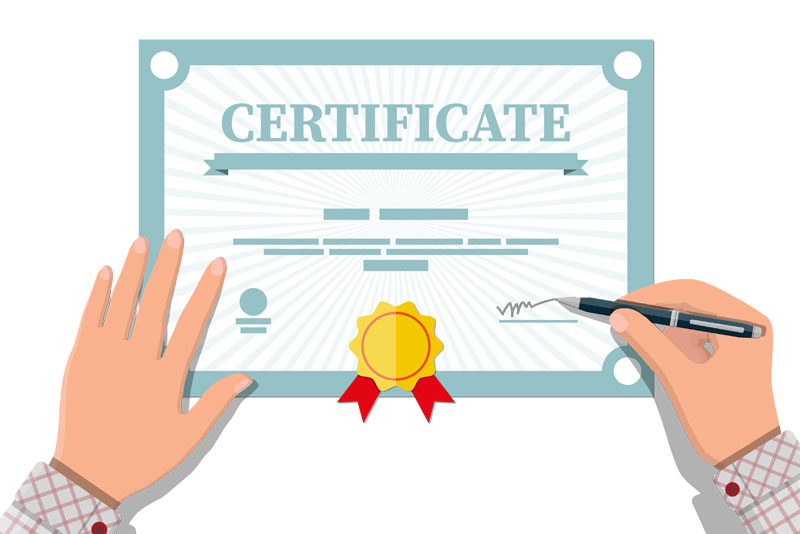If you’re considering starting a business as a Limited Liability Company (LLC), you’ll want to become familiar with the term “Certificate of Formation.” Sometimes called Articles of Organization or Certificate of Organization, a Certificate of Formation is the legal document LLC owners (members) must file with the state to form their business entity.
By filing a Certificate of Formation, LLC members provide the state with the information it needs for deciding to approve or disapprove a company as a registered entity. Each state has its own requirements for forming an LLC, and the information collected on a Certificate of Organization form may vary from state to state. In most states, business owners must submit the filing to the Secretary of State office. After a state approves an LLC Certificate of Formation, the LLC is considered domiciled in that jurisdiction — in other words, that state is regarded as the LLC’s home state.
How to Know If You Need One
Entrepreneurs who want to enjoy the personal liability protection and tax flexibility of legally operating their company as an LLC in a state must have a Certificate of Formation approved by the state. The document certifies the LLC is legally formed under state law, establishing it as a separate legal entity from its owner(s). That separation means that the business owners are not personally liable for the debts of — and legal claims against — the LLC under most circumstances.
Moreover, having an LLC Certificate of Formation can make things go more smoothly when:
- Applying for state and local licenses and permits
- Opening bank and credit accounts
- Getting approved for loans
- Attracting investors
Although business owners don’t need an attorney to obtain or complete the document, it’s helpful to get legal guidance before forming any type of business entity.
Articles of Incorporation vs. Certificate of Formation
Their purpose is similar, but a Certificate of Formation is for LLCs, while Articles of Incorporation are for Corporations. Also, states typically have more startup and ongoing compliance requirements for Corporations than LLCs. For example, Corporations must appoint or elect a Board of Directors and adopt bylaws.
Certificate of Formation vs. Certificate of Authority
While they’re similar in some respects, they are NOT the same! A Certificate of Formation creates an LLC in its home state. A Certificate of Authority is a legal document allowing a business entity in one state to conduct business legally in another. The process for getting approval to do business in another state is called foreign qualification. Not all states share the same definition of “conducting business.” Merely selling products in another state doesn’t necessarily mean a company must foreign qualify there. Generally, having a physical presence (office, store, warehouse) or employees in a state requires foreign qualification there. Also, remote sellers (i.e., an out-of-state business selling products online to customers in states beyond their home state) may need to foreign qualify in another state when their sales revenue or number of sales transactions hit a specific threshold there.
How to Obtain a Certificate of Formation
You’ll need to determine what agency handles business registration in your state to obtain the Certificate of Formation form. Usually, that will be the Secretary of State or a comparable office (such as the Department of State) that oversees business registrations. Most agencies provide online forms that business owners can complete and submit electronically.
Information requested on certificates of formation differs depending on the state. Therefore, it’s important to look at your state’s specific requirements and be prepared with the necessary details.
Typically, states ask for the following information when requesting a Certificate of Formation:
- Name of the LLC
- Statement of Purpose – Many states require only a general description. LLCs often use something like, “The purpose of this Limited Liability Company is to engage in any lawful activity for which a Limited Liability may be organized in this state.” Some states may ask for a more specific purpose statement. If in doubt, consider talking with an attorney.
- Physical address of the principal place of business
- Mailing address
- Whether the LLC’s members or managers will manage the company
- Name and address of the LLC’s registered agent
- Names of the LLC’s organizers (and managers if member-managed)
- Effective date requested – Some states allow for a future effective date.
- Duration of the LLC – Most states will consider an LLC perpetual (continuing indefinitely until formally dissolved) unless otherwise stated in its Certificate of Formation.
- Organizer’s signature
After filling out the Certificate of Formation, submit it and any required fees to the state. States’ filing fees vary. For example, in my home state of California, the current LLC Articles of Organization filing fee is $70 for the filing and $5 for a certified copy, whereas, in New York, the fee is $200 for filing the form and $10 for getting a certified copy. Check with your state to determine the fee to file your paperwork and get a certified copy. The certified copy is optional, but it’s nice to have and doesn’t cost much.
Note: You will incur additional costs if you have an attorney’s or other professional’s assistance completing and filing your Certificate of Formation.
The standard turnaround time from filing a Certificate of Formation online to receiving state approval varies. In some states, the approved document will arrive within a week, while it may take several weeks in others. Some states offer expedited processing for an additional fee.
How to Get a Copy of Your Certificate
Business owners may need an additional certified copy of their LLC’s formation paperwork if they file for foreign qualification in another state or a court requests one.
Most states have an online order form on their websites for requesting copies. Fees for certified copies vary from state to state.
Save Time and Money
By having CorpNet process and file your Certificate of Formation you’ll save both time and money with services that are fast, reliable, and affordable. And our services are backed by a 100% satisfaction guarantee, so you know you’re in good hands.





